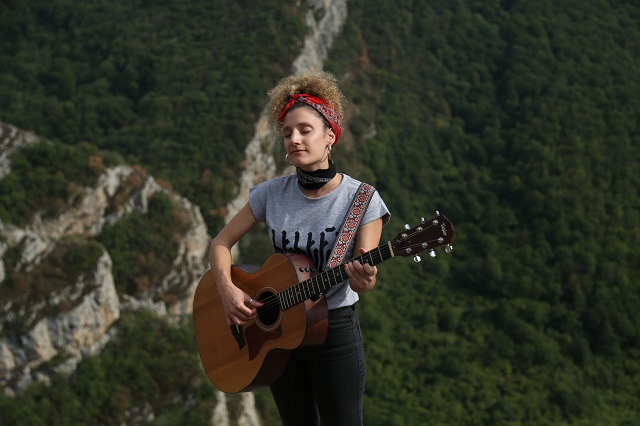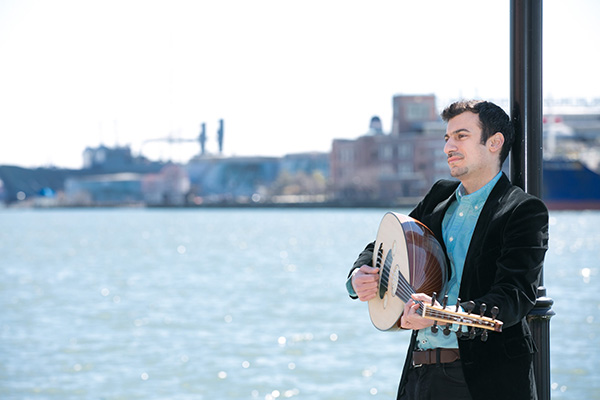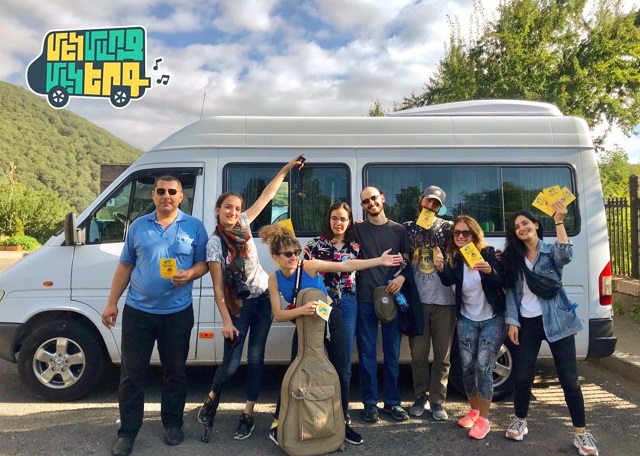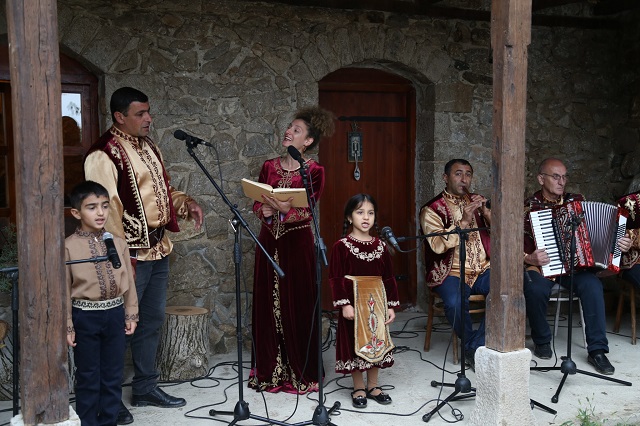The Armenian Weekly. I first met Alin Demirdjian in a shared taxi bound for Gyumri. There was something about her that looked familiar to me – I was sure I’d seen those striking curls flash across my Facebook feed. I sat back, sipped my tahn, and listened to her chat easily with the taxi driver. Then I remembered: this was the girl who had just completed that “Meg Marz, Meg Yerk” musical project! I was fairly certain I wanted to be friends with her, so I waited for my “in”: we were both Birthright Armenia alumni. As it turned out, she’d recently moved to Gyumri (I had a new neighbor!) and taken up lessons in… barbering? As I was soon to discover, she was a girl of many talents and also incredibly down-to-earth. Twenty minutes into the trip, everybody in the taxi was friends with her. The driver was more focused on her music videos than the road, and we were all humming along to her songs…
Growing up in Argentina, musician Alin Demirdjian felt little connection to her ethnic homeland. Although she attended Armenian school, her teachers painted a picture of the Armenia that had been, the land peopled by Tigran Mets, Grigor Lusarovich and Komitas. To Alin, it “felt like a movie.”
But when she arrived in Yerevan to volunteer for several months through the Birthright Armenia program, her perspective changed. She had the chance to mix with Armenians from Armenia and explore the local music scene.
“[The experience] helped me to see Armenia as a normal country and not only as the romantic and historical place they told us about in the Diaspora,” she told me. “I realized that we had learned about history and the Genocide, but I didn’t know anything about real life in the real Armenia.”
With this clearer picture in her mind, Alin returned to Armenia with her mother in 2018. During a trip to Artsakh, an elderly woman approached the two and serenaded them with an accordion. Alin was charmed.
“I felt like I wanted to keep that moment, and I wanted to sing with her, but I didn’t know the songs,” she said.
After that, something “clicked.”
Alin imagined traveling all over the country to seek out locals just like this woman—modern-day Armenians with unique and varied musical talents to share. She wanted to sing along with them and preserve those special moments for everyone to hear. She wanted to explore this modern land she had discovered through the medium of music. And she wanted to share it with people who only knew the “movie” version of Armenia.
The idea stuck with her during the trip back up to Yerevan. A name for the project even popped to mind: “Meg Marz, Meg Yerk,” or “One Province, One Song.”
When she returned to Buenos Aires, Alin wrote out and refined her ideas. She would gather a team and travel throughout Armenia and Artsakh, recording songs with locals in each region. The idea was compelling; after applying for funding, she won one of Birthright Armenia’s “Next Step” grants for alumni.
Alin also decided to add an educational element to her project. She visited Armenian schools in South America just like the one she had attended as a child. During her presentations, she promoted Birthright Armenia, the means by which she had begun to understand present-day Armenia. She also worked to form a connection with the youth and to make Armenian music more relevant to their lives. Many of the young people knew only of traditional and patriotic songs; they were completely surprised to find out about the artists shaping the current musical landscape.
“I asked the students: ‘What kind of music do you like? Pop? Trap?” She amazed some of them with this revelation: “There are artists doing Trap in Armenia in Armenian!”
Alin wanted to give Diasporans a taste of the music in Armenia and whet their appetites to do their own research and discover more. She hoped that Armenians in Armenia and even people with no connections to the culture would also be intrigued.
“If you watch the episodes [of the project], you are going to know more about the country and what’s going on nowadays through artists – traditional, non-traditional, electronic music, pop, church music, everything,” Alin says.
From Buenos Aires, she embarked on the second phase of her project: assembling her production team in advance of the tour through all 19 provinces of Armenia and Artsakh. Alin was acquainted with only two of her team members before the project began; the others were onboarded through recommendations and video chat interviews.
“It was crazy. No one knew how it was going to be,” she remembers of the planning period.
But Alin proved the maxim that anything is possible when you have the right people around you. Passionate about the project goal, her team members went above and beyond to make it come to fruition.
In fact, more than the variegated vineyards of Armavir, the sandy shores of Sevan and the purple peaks of Shushi, Alin’s favorite mental image is of her teammates.
“Most of the memories I have are inside the marshrutka, our van, when I was traveling with the team. Most of them were sleeping, and I was always watching them and thinking to myself ‘I can’t believe this is happening, that I have this amazing team working on this project, believing in this idea!’”
“I am so lucky and blessed that I met these people,” she says. “[They were] the best scenery for me.”
Alin also has fond memories of the locals who eagerly shared their talents and time.
Before the team had convened in Armenia, Alin worked together with her Yerevan-based musical director to identify local music groups in almost every region of Armenia and Artsakh. In some provinces, Alin sang alongside well-known groups like Gyumri’s rock band “Bambir” (featured in Episode 2). In other regions, the team had no connections, so they put out an open call. Usually, the social media world delivered, connecting them with artists, choruses or groups. But they couldn’t identify any groups in Artsakh’s Shahumyan region. They arrived there on the last day of their stay in Artsakh, hoping that asking around would yield fruit.
A stressful period of searching turned into a great memory for Alin, who fondly remembers the episode which blossomed from the last-minute hunt.
“[The locals] said, ‘There is this little girl, Meri, and she plays the dhol [the Armenian percussion instrument].’ So we went to her house in the middle of a lovely village. And she was with her mom and her family and they were all so happy that we were there and wanted to record with her.”
The group decided to sing a patriotic song about the deportation of Armenians from Getashen. It took a village—literally—to put everything together. Meri invited a schoolmate to sing along with Alin while she played her dhol. The neighbors provided their backyard as the backdrop, and Meri’s family invited the whole team to dinner after the recording. Months later, when Alin returned to Artsakh for a visit, she enjoyed a sweet reunion with Meri’s family and even visited the girl’s school.
After watching Episode 15 of the project, you’d never know that it came together so quickly. But that’s one of Alin’s favorite elements of Armenian culture. “When you have an idea, I like how people support that,” she says. “And how easy it is to do things.”
The Ministries of Culture of Armenia and Artaskh were similarly supportive in spreading awareness about the project and connecting the team with resources. Several regional governments covered the team’s hotel stays. The My Step Foundation and AGBU also contributed funding.
“This journey was a reaffirmation that I like Armenia. I like being here, not just because I am Armenian… I like the people,” Alin says. “It’s not a duty. It’s a nice place to be and to discover.”
Alin has a lot of Instagram followers—mostly in Argentina—who aren’t Armenian. As they followed her tour over social media, many became entranced by the little country they’d never heard of.
“I didn’t know about Armenia and Artsakh,” one said. “I want to go there!”
Another began researching the region, and one even started to tackle the Armenian language.
That was exactly what Alin had hoped to see.
“People should listen to more music from Armenia, even if they don’t understand the language,” she says.
Music is a language in itself; it transcends culture. For example, Episode 9, recorded with Vardan Galstyan, is one of Alin’s favorites. The song is “simple, honest and authentic,” and viewers told her that they felt the emotions, even though many couldn’t understand the words.
For Alin, the project was about connection – connecting people with good music, connecting Diasporans with modern Armenia, and connecting authentically with locals.
After the recording period ended, Alin made a trip to Gyumri to present her project to the Birthright Armenia volunteers serving there.
While she walked the cobblestone streets of the city center, she fell in love with the preserved tuff architecture, the Soviet-era Central Park and… the old barber shop just off the main square. Ever since she was a little girl, Alin had always wanted to learn how to cut hair. Although she had spent a little time studying the trade in Buenos Aires, she had never gotten very far. In Gyumri, she felt at home. The city was alive in its gritty authenticity.
So she decided to move from Yerevan and begin studying with the master barbers. Although she first drew some attention as the only woman among the all-male staff and clientele, she was quickly drawn into the tight-knit group.
The coronavirus-induced quarantine put an early end to her apprenticeship, but she still talks on the phone several times a week with her colleagues.
“Working every day in an old, traditional place like that was so real,” she says. “I was learning a lot, not only to cut people’s hair. They became my family.”
Through her “Meg Marz, Meg Yerk” project and her experience in Gyumri, Alin has continued to uncover the real Armenia. While her motherland has many claims to fame, Alin still believes that “everyday people’s lives” are its most beautiful aspect to discover.
Since you can’t travel right now, it’s the perfect time to take a virtual musical tour through Armenia and Artsakh and watch all 19 episodes of Alin’s “Meg Marz, Meg Yerk” project.
Sarah Stites
Main caption: Musician Alin Demirdjian



























































